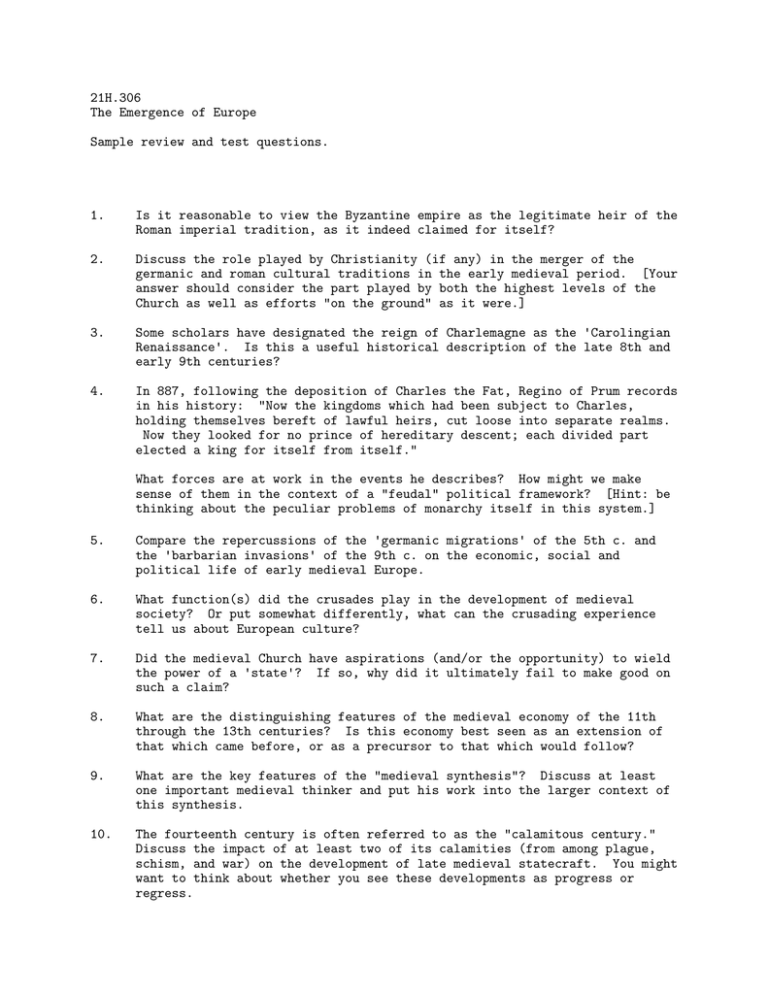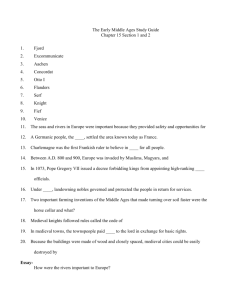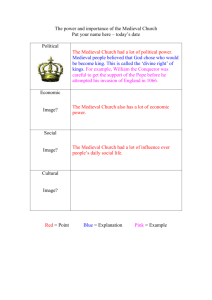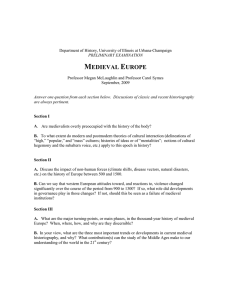21H.306 The Emergence of Europe Sample review and test questions.
advertisement

21H.306 The Emergence of Europe Sample review and test questions. 1. Is it reasonable to view the Byzantine empire as the legitimate heir of the Roman imperial tradition, as it indeed claimed for itself? 2. Discuss the role played by Christianity (if any) in the merger of the germanic and roman cultural traditions in the early medieval period. [Your answer should consider the part played by both the highest levels of the Church as well as efforts "on the ground" as it were.] 3. Some scholars have designated the reign of Charlemagne as the 'Carolingian Renaissance'. Is this a useful historical description of the late 8th and early 9th centuries? 4. In 887, following the deposition of Charles the Fat, Regino of Prum records in his history: "Now the kingdoms which had been subject to Charles, holding themselves bereft of lawful heirs, cut loose into separate realms. Now they looked for no prince of hereditary descent; each divided part elected a king for itself from itself." What forces are at work in the events he describes? How might we make sense of them in the context of a "feudal" political framework? [Hint: be thinking about the peculiar problems of monarchy itself in this system.] 5. Compare the repercussions of the 'germanic migrations' of the 5th c. and the 'barbarian invasions' of the 9th c. on the economic, social and political life of early medieval Europe. 6. What function(s) did the crusades play in the development of medieval society? Or put somewhat differently, what can the crusading experience tell us about European culture? 7. Did the medieval Church have aspirations (and/or the opportunity) to wield the power of a 'state'? If so, why did it ultimately fail to make good on such a claim? 8. What are the distinguishing features of the medieval economy of the 11th through the 13th centuries? Is this economy best seen as an extension of that which came before, or as a precursor to that which would follow? 9. What are the key features of the "medieval synthesis"? Discuss at least one important medieval thinker and put his work into the larger context of this synthesis. 10. The fourteenth century is often referred to as the "calamitous century." Discuss the impact of at least two of its calamities (from among plague, schism, and war) on the development of late medieval statecraft. You might want to think about whether you see these developments as progress or regress. 11. Read the following passages, both dating from the 9th century. Write a short essay about medieval lordship and vassalage centered on the information revealed in these passages. You may of course also draw on a larger body of relevant information to supply context. English -- 9th c. Thus shall one take the oath of fidelity: By the Lord before whom this sanctuary is holy, I will to N. be true and faithful, and love all which he loves and shun all which he shuns, according to the laws of God and the order of the world. Nor will I ever with will or action, through word or deed, do anything which is unpleasing to him, on condition that he will hold to me as I shall deserve it, and that he will perform everything as it was in our agreement when I submitted myself to him and chose his will. It is right that those who offer to us unbroken fidelity should be protected by our aid. And since N. a faithful one of ours, by the favor of God, coming here in our palace with his arms, has seen fit to swear trust and fidelity to us in our hand, therefore we decree and command by the present precept that for the future N above mentioned be counted with the number of antrustions. And if anyone perchance should presume to kill him, let him know that he will be judged quilty of his wergild of 600 shillings. Capitulary of Mersen (Kings Lothar, Lewis, and Charles, 847) We will moreover that each free man in our kingdom shall choose a lord, from us or our faithful, such a one as he wishes. We command moreover that no man shall leave his lord without just cause, nor should any one receive him, except in such a way as was customary in the time of our predecessors. And we wish you to know that we want to grant right to our faithful subjects and we do not wish to do anything to them against reason. Similarly we admonish you and the rest of our faithful subjects that you grant right to your men and do not act against reason toward them.






